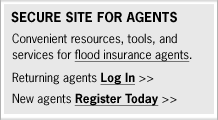
Once water levels have dropped, here’s what you can do to stay safe and start the recovery process.
- If your home has suffered damage, call the agent who handles your flood insurance to file a claim. If you are unable to stay in your home, let the agent know where you can be reached.
- Check for structural damage before re-entering your home—you don’t want to be trapped in a building collapse.
- Take photos of any water in the house and save damaged personal property. This will make filing your claim easier. If necessary, place these items outside the home. An insurance adjuster will need to see what's been damaged in order to process your claim.
- Make a list of damaged or lost items and include their age and value where possible. If possible, supply receipts for those lost items to the adjuster. Officials may require disposal of damaged items. If so, keep a swatch or other sample of the items for the adjuster.
- Prevent mold by removing wet contents immediately. Wet carpeting, furniture, bedding, and any other items holding moisture or water inside the building can develop mold within 24 to 48 hours. Items should be cleaned with a phenolic or pine-oil cleaner and bleach solution, completely dried, and monitored for several days for any fungal growth and odors. If any mold develops, throw the item away.
- Do not use matches, cigarette lighters or other open flames upon re-entering your property. Gas may be trapped inside. If you smell gas or hear hissing, open a window, leave quickly and call the gas company from a neighbor's home.
- Keep power off until an electrician has inspected your system for safety.
- Avoid using the toilets and the tap until you have checked for sewage and water line damage. If you suspect damage, call a plumber.
- Throw away any food including canned goods that have come in contact with floodwaters.
- Boil water for drinking and food preparation until local authorities declare your water supply to be safe.
- Salvage water-damaged books, heirlooms, and photographs using restoration tips from the NFIP.
- Follow local building codes and ordinances when rebuilding. Use flood-resistant materials and techniques to protect your property from future flood damage.



Last Updated: Monday, 05-Jan-2009, 2:37 PM (EST)

500 C Street SW, Washington, D.C. 20472
Disaster Assistance: (800) 621-FEMA, TTY (800) 462-7585
U.S. Department of Homeland Security
FEMA Home | Contact FEMA |
Privacy Policy | Important Notices |
FOIA | USA.gov | DHS
